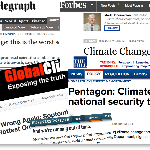
Giving science a voice amid the confusion of climate change media coverage by Climate Feedback
Please find below the
Semi-Finalist Evaluation
Judges'' comments
Proposal: Giving science a voice amid the confusion of climate change media coverage
Contest: Shifting Attitudes & Behavior
Thank you for your contest entry. We appreciate your willingness to share your ideas and also the time and effort you put into developing a proposal and submitting it to the contest.
We, the Judges, have strongly considered your proposal and found that it contained intriguing elements; however, we have chosen to not advance it to the next round of competition.
We encourage you to keep developing your idea. Transfer your proposal to the Proposal Workspace to re-open it, make edits, add collaborators, and even submit it into a future contest. You can do so by logging into your account, opening your proposal, selecting the Admin tab, and clicking “Move proposal”.
We welcome you to stay involved in the Climate CoLab community: support and comment on proposals that have been named Semi-Finalists and finalists, and even volunteer to join one those teams if you have relevant expertise. During the voting period, you can help select the contest’s Popular Choice Winner. The Climate CoLab will be opening more contests in the coming months, and you are welcome to submit your proposals to those contests as well.
Keep up the great work. We hope that by working together, we all can create solutions that wouldn’t otherwise be possible.
2015 Climate CoLab Judges
Judges' Comments-
Love it!
How will you curate the group of scientists who are allowed to provide annotations?
This* can get big and messy quickly. (*Any scientist who meets minimum academic qualifications criteria will be allowed to annotate.")
Excellent use of existing platform, Hypothesis. Concerns: What happens if Hypothesis goes under. Is Hypothesis a startup? Well-Established? Do you need a plan B for that aspect?
You could partner with a highly regarded entity such as Yale Climate Communication, UN, Union of Concerned Scientists, Climate Central, and/or Metcalfe Institute to create your rockstar panel of experts. Great work so far on assembling a high-level community of scientists.
Will participating scientists need to be incentivized (paid)?
On the Coordinators, who are they? How to be sure they aren’t biased. Perhaps this is a prestigious enough role, for volunteers to be unpaid. (See the MIT Climate CoLab judges for a precedent!)
Concern: How will you select media coverage to include? Doubtful that you can include every single news report, video clip, and podcast that appears.
Will the user be able to view a scientist only version of Climate Feedback? Worried that the platform becomes way too noisy if you welcome non-scientists to comment. Just have a look at the NYTimes online comments for a Justin Gillis piece. It can get noisy quickly.
I certainly support the idea of bringing more scientific accuracy to public information about climate change. I also like the idea of having some kind of educated, informed, and trusted check on what journalists communicate. However, this proposal raises several concerns. For one, it is clear that scientists are trained to communicate primarily with other scientists (or students, or scientists-in-training) and are rarely trained to communicate with the public. The culture and language of scientists is literally foreign and frequently misunderstood by the non-scientists. For example, we (scientists) are rarely willing to state something is entirely certain, nor are we willing to state an outcome is 'better' or 'worse.' I am concerned that scientists who correctly point out uncertainties, use technical jargon, or use terms that have different meaning outside of their field (e.g., 'positive feedback') will not be effective communicators for a public audience. I would be interested to hear what the proposers might do to address this potential issue. Other concerns include defining 'minimum academic qualifications' (this especially after the Global Warming Petition Project, in which >31,000 'scientists' rejected anthropogenic climate change), and enlisting active climate scientists in the project.
No comments have been posted.